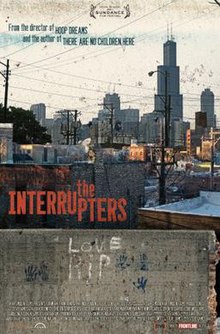
Hoop Dreams is a 1994 American documentary film directed by Steve James, and produced by Frederick Marx, James, and Peter Gilbert, with Kartemquin Films. It follows the story of two African-American high school students, William Gates and Arthur Agee, in Chicago and their dream of becoming professional basketball players.
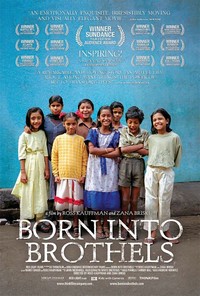
Born into Brothels: Calcutta's Red Light Kids is a 2004 Indian-American documentary film about the children of sex workers in Sonagachi, Kolkata's red light district. The widely acclaimed film, written and directed by Zana Briski and Ross Kauffman, won a string of accolades including the Academy Award for Best Documentary Feature in 2005.
Steve James is an American film producer and director of several documentaries, including Hoop Dreams (1994), Stevie (2002), The Interrupters (2011), Life Itself (2014), and Abacus: Small Enough to Jail (2016).

ITVS is a service in the United States which funds and presents documentaries on public television through distribution by PBS and American Public Television, new media projects on the Internet, and the weekly series Independent Lens on PBS. Aside from Independent Lens, ITVS funded and produced films for more than 40 television hours per year on the PBS series POV, Frontline, American Masters and American Experience. Some ITVS programs are produced along with organizations like Latino Public Broadcasting and KQED.
Kartemquin Films is a four-time Oscar-nominated 501(c)3 non-profit production company located in Chicago, Illinois, that produces a wide range of documentary films. It is the documentary filmmaking home of acclaimed producers such as Gordon Quinn, Steve James, Peter Gilbert, Maria Finitzo, Joanna Rudnick, Bing Liu, Aaron Wickenden, and Ashley O’Shay (Unapologetic).
Jeff Fort, also known as Abdul Malik Ka'bah, is an American mobster and former gang kingpin from Chicago, Illinois.
Gordon Quinn is artistic director and founding member of Kartemquin Films and a 2007 recipient of the MacArthur Award for Creative and Effective Institutions. Gordon Quinn has been making documentaries for over 45 years and has produced or directed over 30 films. His recent directing credits include Prisoner of Her Past and A Good Man. His producing credits include the films Hoop Dreams; In the Family;Vietnam, Long Time Coming; Golub: Late Works Are the Catastrophes; 5 Girls; Refrigerator Mothers; and Stevie. Most recently, Gordon executive produced Mapping Stem Cell Research: Terra Incognita and The New Americans, for which he directed the Palestinian segment. Currently, he is executive producing several new films for Kartemquin.
Prashant Bhargava was an Indian-American filmmaker and designer. He died of a heart attack from a history of heart trouble. Bhargava's short film Sangam, described by Greg Tate of the Village Voice as "an elegant and poetic evocation of immigrant angst, memory and haunted spirituality", premiered at the Sundance Film Festival, and PBS. His other directorial efforts include the documentary portrait of his grandmother Ammaji, experimental Super 8 short Backwaters and the poignant and meditative Kashmir, an audiovisual performance with band Dawn of Midi
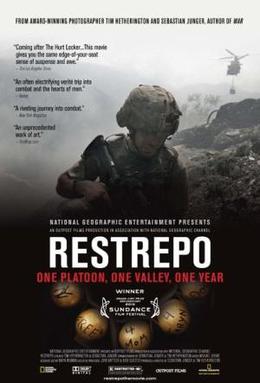
Restrepo is a 2010 American documentary film about the War in Afghanistan directed by British photojournalist Tim Hetherington and American journalist Sebastian Junger. It explores the year that Junger and Hetherington spent, on assignment for Vanity Fair, in Afghanistan's Korengal Valley, embedded with the Second Platoon, B Company, 2nd Battalion, 503rd Infantry Regiment, 173rd Airborne Brigade Combat Team of the U.S. Army. The Second Platoon is depicted defending the outpost (OP) named after a platoon medic who was killed earlier in the campaign, PFC Juan Sebastián Restrepo, who was a Colombian-born naturalized U.S. citizen. The directors stated that the film is not a war advocacy documentary, they simply "wanted to capture the reality of the soldiers."
rakontur is a Miami-based media studio founded by Billy Corben and Alfred Spellman in 2000.
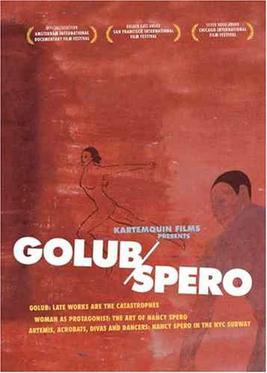
Golub is a 1988 documentary film, produced by Kartemquin Films, that examines the life and work of controversial painter, Leon Golub. Inspired by war, political oppression and the fight for Free Speech, Golub and his paintings are famous for their depictions of extreme violence. Also featured prominently in the film is his wife, anti-war feminist and artist, Nancy Spero. The documentary tracks Golub from starting with a blank canvas to a touring North American exhibition and eventually to an exhibition in Northern Ireland.

Into the Abyss is a 2011 documentary film written and directed by Werner Herzog. It is about capital punishment, and focuses on a triple homicide that occurred in Montgomery County, Texas, in 2001. In the film, Herzog interviews the two young men convicted of the crime, Michael Perry and Jason Burkett, as well as family members and acquaintances of the victims and criminals, and individuals who have taken part in executions in Texas. The primary focus of the film is not the details of the case or the question of Michael and Jason's guilt or innocence, and, although Herzog's voice can be heard as he conducts the interviews, there is a minimal amount of narration, and he never appears onscreen, unlike in many of his films.

The Tsunami and the Cherry Blossom is a 2011 American-Japanese documentary film directed by Lucy Walker. The film was nominated for the 2012 Academy Award for Best Documentary.
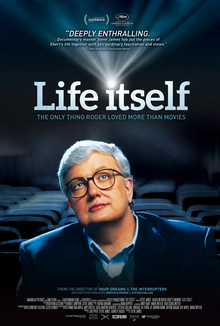
Life Itself is a 2014 American biographical documentary film about Chicago film critic Roger Ebert, directed by Steve James and produced by Zak Piper, James and Garrett Basch. The film is based on Ebert's 2011 memoir of the same name. It premiered at the 2014 Sundance Film Festival and was an official selection at the 67th Cannes Film Festival. The 41st Telluride Film Festival hosted a special screening of the film on August 28, 2014. Magnolia Pictures released the film theatrically in the United States and simultaneously via video on demand platforms on July 4, 2014.
Cable News Network Films is a motion picture division of CNN under Warner Bros. Pictures, originally launched in 2012. Its first film, Girl Rising premiered in spring 2013 in the United States.

Heather Ann Croall is an international arts festival CEO and artistic director and documentary producer, best known for leading Sheffield Doc/Fest and Adelaide Fringe, and her work on live music / archive films including The Big Melt, From the Sea to the Land Beyond, Girt By Sea, From Scotland With Love, Atomic, Living in Dread and Promise
Unbroken Glass is a 2016 independent documentary film, directed by Dinesh Das Sabu and produced by Kartemquin Films. Unbroken Glass weaves together Das Sabu's journey of discovery with cinéma vérité scenes of his family dealing with still raw emotions and consequences of his immigrant parents’ lives and deaths. The film was shot over five years in Illinois, New Mexico, California, and India.
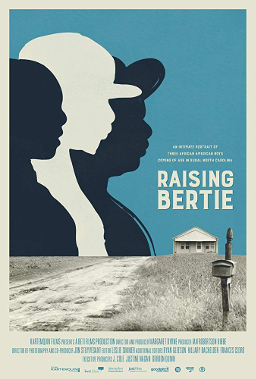
Raising Bertie is a 2016 American documentary film directed by Margaret Byrne and produced by Ian Robertson Kibbe, Margaret Byrne, and Jon Stuyvesant. It was distributed by Kartemquin Films and aired in shortened form on the 30th season of PBS's documentary series POV on August 28, 2017.

The Curve is a 2020 documentary film written, directed, and produced by Adam Benzine. It is about the United States' response to the COVID-19 pandemic. It was released on the internet on October 27, 2020, a week before the United States presidential election.

Street Gang: How We Got to Sesame Street is a 2021 American documentary film directed by Marilyn Agrelo. Based on the non-fiction book Street Gang by Michael Davis, the film chronicles the development and airing of the children's television program Sesame Street, featuring interviews with series creators Joan Ganz Cooney and Lloyd Morrisett, as well as writers, actors, and artists involved in its creation.
